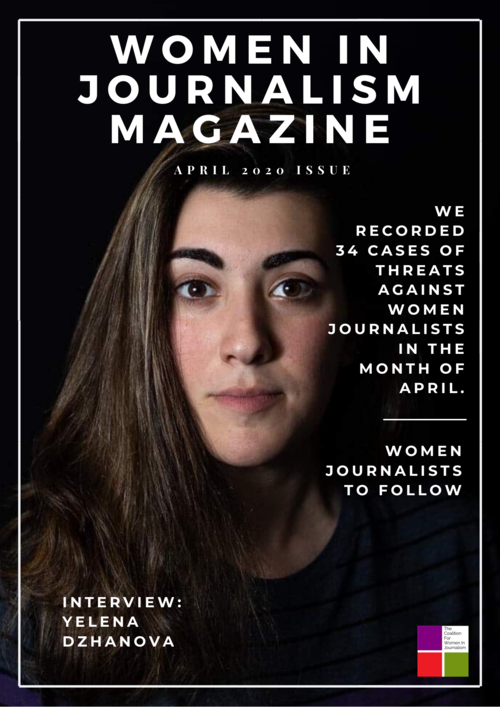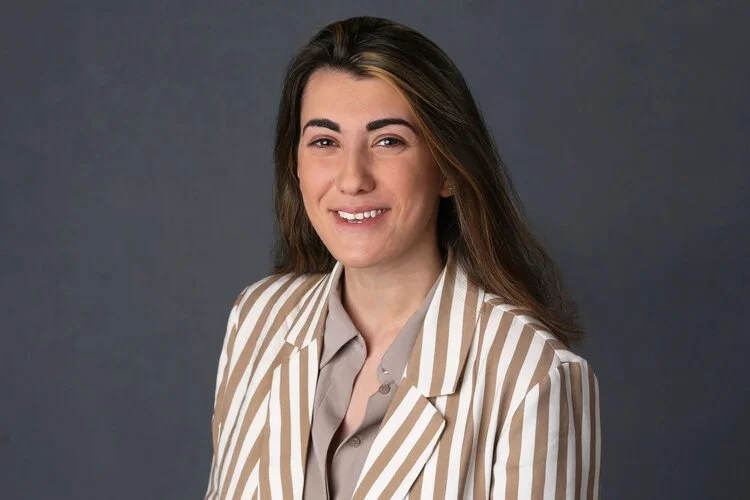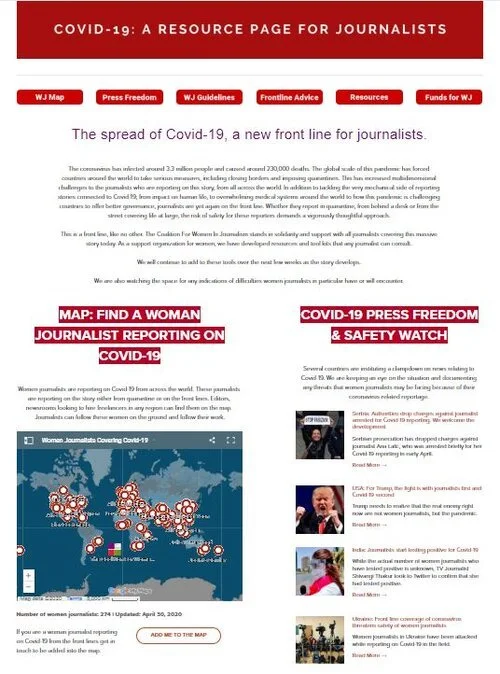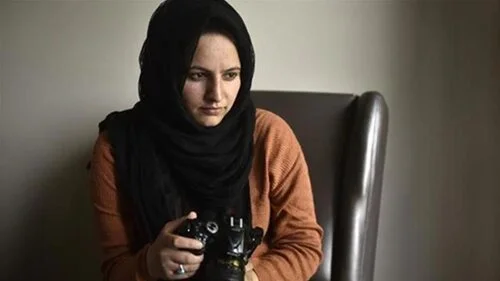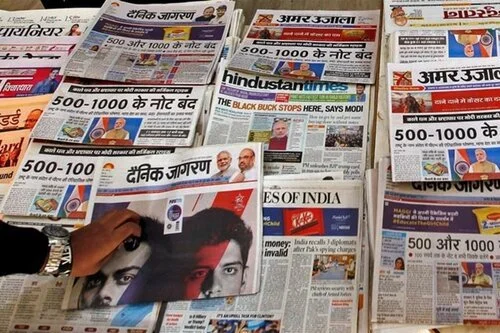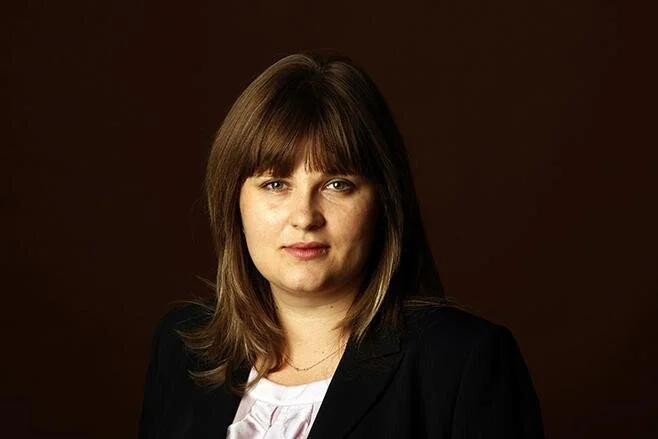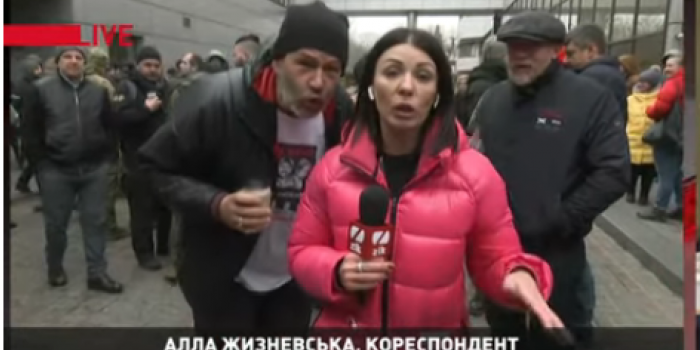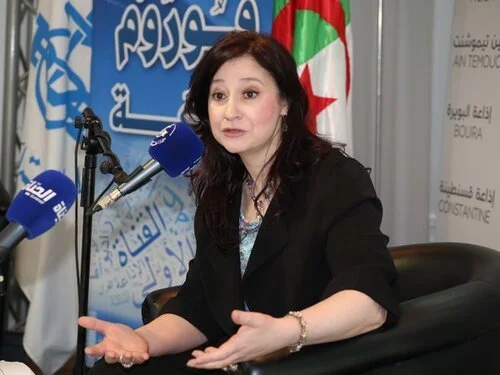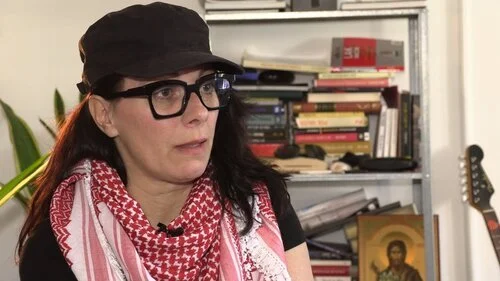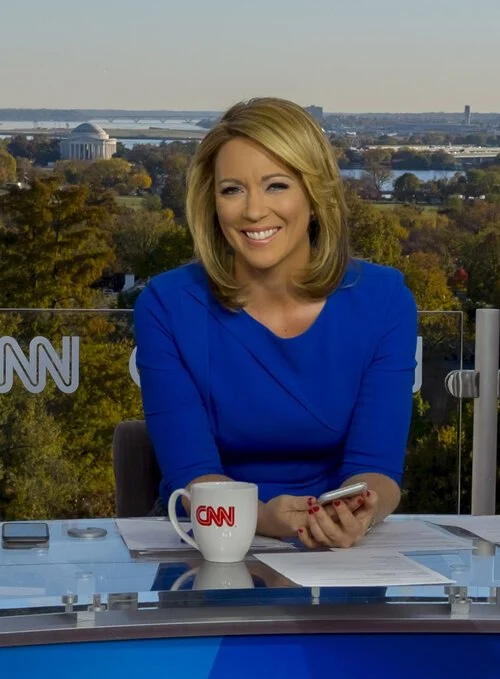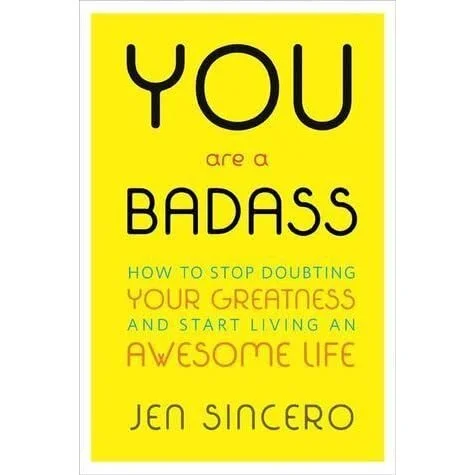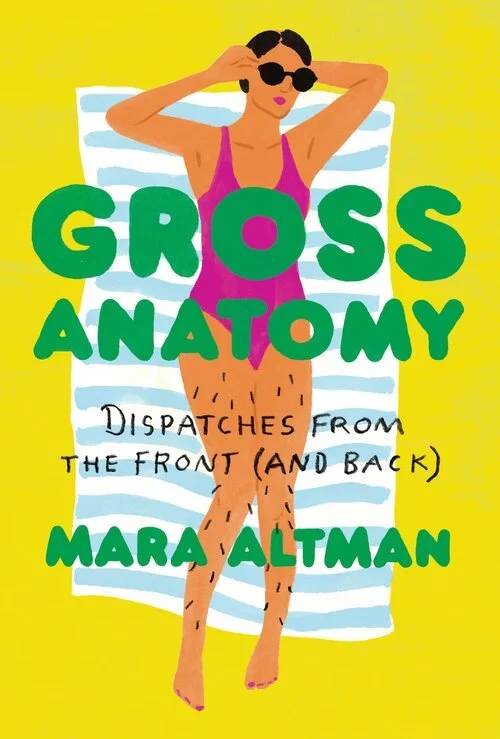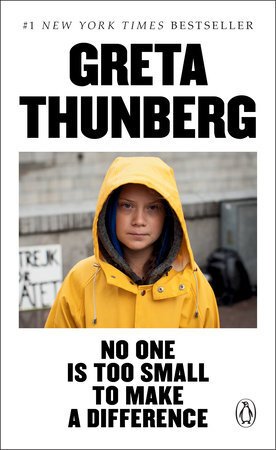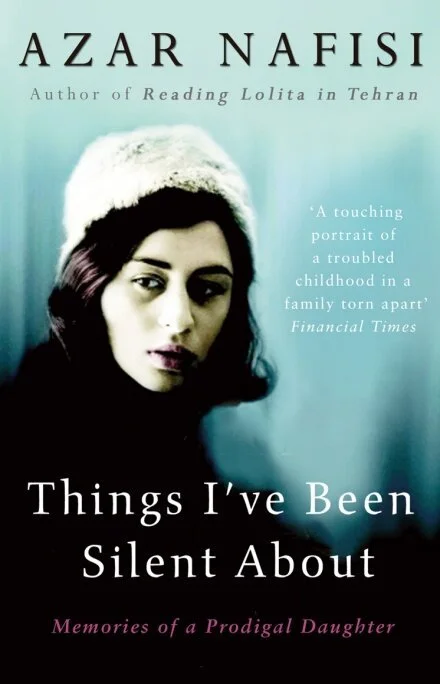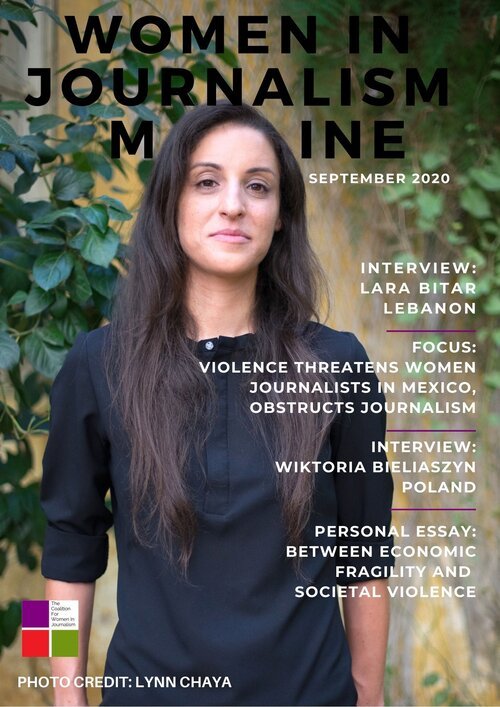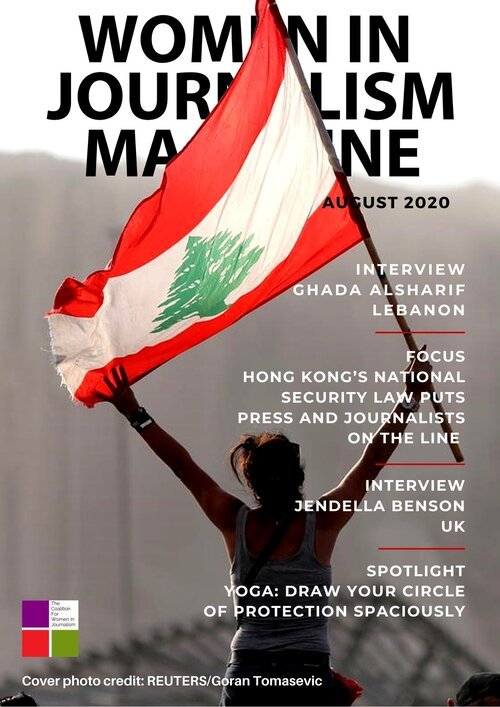April 2020 Issue
In this issue, we interview CNBC’s Yelena Dzhanova, highlight Covid-19 resources scoured by CFWIJ, feature CFWIJ’s efforts for women journalists who are reporting coronavirus on the frontline, and our picks for monthly women journalists to follow. Go read.
Editor’s Note
Hello readers,
Hope you all have been staying safe and healthy.
Most of us have been living under lockdowns and restrictions on movement, and finding ways to keep ourselves motivated during these challenging times. But we're all trying our best to not lose hope.
This month we're back with our latest issue of Women In Journalism magazine, where we feature an interview with New York-based journalist Yelena Dzhanova who is covering the coronavirus outbreak for CNBC. We also highlight the work we've been doing ever since Covid-19 intensified. The round-up section from April showcases 34 cases of threats to women journalists.
CFWIJ has been busy keeping track of what our colleagues have been doing around the world. From live Instagram sessions with women journalists to documenting their experiences on our dedicated Covid-19 webpage, we have been monitoring the impact women journalists have been making while reporting on the ground.
Stay safe.
Happy Reading!
Index
Interview - Yelena Dzhanova
Yelena Dzhanova is a journalist based in New York. She works as a news associate covering breaking news and breaking news at CNBC. CFWIJ spoke with Yelena to understand how she has been covering the Covid-19 as a journalist in the US, the impact of stories she has come across while doing so, her observation about the changes in the country’s political dynamics amid the pandemic and Trump administration’s reluctance to sharing information as part of the response to the coronavirus, as well as his regular tiffs with women journalists. Scroll through to read her interview.
CFWIJ: Around 160k confirmed cases of Covid-19 have been recorded in New York with over 12,000 deaths. While the US, on the whole, has reported at least confirmed 972,900 cases and 55,118 deaths. New York, where you reside has been hit hard as well. You’re reporting from the city. What have you witnessed in your reportage?
Yelena: CNBC, as a whole, began focusing on the coronavirus sometime in early January. This was the time when people were focusing on China, Italy and France and the effects that coronavirus had on them, but not so much on the United States. In New York, particularly, it’s hitting people in a lot of different ways. There are people who have a chance to stay at home, but there are also people who don’t have the chance to stay at home. They are still forced to take the subway, public transportation and head to these locations where the coronavirus is spreadable — it’s kind of dangerous for them.
There are a lot of people I know who work in hospitals, there are people who are fearful and don’t want coronavirus to hit their families, older relatives, parents, younger children and younger siblings. It’s tough to witness all of that. When you’re a reporter you hear all these kinds of stories from people that you talk to who are sources or people who you’re trying to get permission from and people who paint a picture of what’s going on around the world and it’s just heartbreaking to hear that a lot of times.
How has Covid-19 affected your life and work and how have you been dealing with it so far?
Most of CNBC is able to work from home. But it’s really tough to work from home. Even though I say it’s luxurious, it’s weird, because I have to rewire my focus more often these days. Instead of being in an office setting that encourages productivity, I’m in my living room. When I wake up, I see my cat staring at me and waiting for me to play with him or I see dirty plates on the table that I haven’t cleared yet. It’s a distracting environment for me personally.
On a more professional note, it’s really hard to hear all these stories from individuals who have been deeply affected by the coronavirus or scared that they’re going to be. Part of being a journalist is facing the truth and not shying away from it and sometimes the truth can be brutal. I was on the phone with a source a week or so ago, and he told me how he lost his wife in the 2017 Las Vegas mass shooting, which caused him to spiral into a state of depression and substance abuse. Now he’s homeless and worried about the coronavirus because he’s living in a shelter in close quarters with so many other people.
It’s unbelievably hard to hear things like this and you deal with it as best as you can. The most striking thing is that normally home for me, as a journalist, is a place where I can let go and unwind, focus on other parts of my life. But because I’m working from home — and I’m sure a lot of journalists feel that as well — the line between work and home has blurred.
You’ve been covering politics and breaking news. What methods are you employing to keep a check on the developments around Covid-19?
That has been a challenge for every reporter right now. It is tough to keep up with the developments around Covid-19, mainly because the death numbers and the number of confirmed cases globally and nationally rise every single day. Secondly, it is because the response from the White House and from other administrative officials tends to fluctuate often.
Sometime in mid-January or so Trump said that the virus was under control and a few weeks later individual states began taking it more seriously and people were told to stay home in many states. When you think about it, the President has a lot of information that is not readily available, and according to several accounts, has been warned of the affects and the potential threats of the coronavirus. Then in March, Trump again tried to reassure the numbers of the GOP and Republican donors that he had the outbreak in control. But just a couple of days later, he declared a state of emergency and completely reversed his original standpoint of having everything in control. There are a lot of conflicting messages coming from the White House that you have to keep track of and take into account as you report on developments.
“The Trump administration has been really adamant about giving information off the record, even if it’s a simple thing like directing you to another agency. ”
I am lucky because the CNBC team is on the front and keeping track of these developments. Every single reporter in the world is basically on the coronavirus beat right now. CNBC has been at the front of it. We sensed that we were doing a very big deal relatively early on from January when the coronavirus was still a major concern abroad and we tackled it though. Luckily, it’s been good.
Do journalists feel less informed and impeded in terms of the information White House has been keeping from them?
I have heard that being a journalist is tough at any point in history because it’s a difficult career to have. You’re under pressure, responding to these political figures and getting false information, and you have to sift through that. But it is especially tough right now in the Trump administration where you have this deeply polarizing figure at the head of the country, the leader of the United States, which is arguably the most important seat in the entire world. He is sometimes issuing orders of violence against you and directing his supporters to conduct those orders and it’s really scary.
It is a really weird time for journalists in America. Press freedom is given as guarantee and nobody can take that from you but then there is the Trump administration, in particular, doing some backward stuff that doesn’t coincide with the amendment. It doesn’t really make sense. They are trying to stifle the press, find different alternate ways to limit the powers of the press and limit the knowledge of the press.
The Trump administration has been really adamant about giving information off the record, even if it’s a simple thing like directing you to another agency. You don’t really know what to do with that information, you can write that ‘the White House has declined to comment’ in your article, which is kind of flimsy because they did not necessarily decline to comment but they declined to comment on the record. It is a little weird — press freedom is being twisted in a way that it hasn’t been twisted before.
What is your take on the ongoing layoffs, pay cuts and furloughs in the US media and journalism industry?
It’s terrible. Layoffs, pay cuts, furloughs at any time in the industry suck. They are really tough to deal with, especially the strain on local journalism, which is generally already suffering. It was suffering even before the outbreak. I don’t think people really understand how important journalism is. Maybe it is for a lot of reasons. Maybe it is partially because of the rhetoric coming of white house against journalists and the press; maybe because journalism is not usually taught in schools in the United States; maybe people are not interested in news or they are not following the news — whatever reason is.
I don’t think people understand the role that journalism plays. Journalism is supposed to lay bare what is out there and shines a spotlight on injustices, good deeds, struggles it contributes to and often begins movements. A lot of times, local journalism is where it all starts. I don’t think the public is receiving any favors when journalists are laid off, especially in massive waves like this. Going forward, it only puts a further strain on journalism and limits our resources and capabilities. It puts the US into this black hole in a way, which is not entirely a huge one, but it is the beginning of one where certain bits of information are missing and there are not going to be present or put out there because you have fewer journalists on line.
Several journalists - both, freelancers and full-time employees at media outlets - have suffered from the financial consequences of Covid-19. How has been for you and your colleagues at CNBC?
We’ve been seeing high traffic across all that goes on our websites at least. I haven’t heard of any consideration about layoffs or pay cuts. I haven’t heard anything related to the coronavirus accept that a few top leaders have announced that they’ll be donating part of their salary for funding research. Generally, we’ve been doing well, seeing high numbers and high traffic. I don’t think that is the story for a lot of other organizations, but at CNBC this is the case.
What new safety precautions have you observed that journalists have been taking? Are there any limitations in their ability to report safely?
There was this amazing photo circulating online where several reporters, surrounding Senator Mitch McConnell, were wearing masks, but McConnell was not. The reporters were standing six or seven feet apart from him. This was quite the sight because when reporters are on the Hill, they are bunched together, trying to get a word and hear what the official is saying to another reporter. But in this case, everyone was spread out, they were considerably fewer reporters, the seats were emptier and there was a lot of empty space. It was a sight to behold.
Journalists have started listening to CDC precautions, they’re wearing masks, some of them are wearing gloves, they are standing at a distance from one another, local reporters on TV are standing at a distance from their sources, and they are using extended mics to reach out to the source at a distance.
Local reporters have the brunt of limitations imposed on them because they are the ones who are on the ground or more hands on with the stories. A lot of local news reporters in New York, in particular, have had to forgo in-person visits to places that they’re covering, and people that they’re meeting up with. They have had to find other ways to do their jobs. But they are taking precautions, as advised, because it is a scary time. They don’t want to contract and spread the disease. They are trying their best to do their job as well as they can.
Following your reporting on politics in the US, particularly amid the ongoing coronavirus crisis, what does the future of American politics look like to you, as a journalist?
In terms of institutional politics, a lot of change is going to arise. The thing about pandemics is that they showcase where you’re the weakest. In this case, the US was not prepared to deal with one. A lot of ideas that were deemed radical like Bernie Sander’s proposal for ‘Medicare for All’, Andrew Yang’s proposal for a universal basic income, are now suddenly being floated as real possibilities. Major heavy weights like Nancy Pelosi - Speaker of the United States House of Representatives - are considering these ideas because of the coronavirus. The coronavirus, like any catastrophic event, is going to change many things about the way our country runs.
Trump has been rather problematic following his take on Covid-19, especially in his interactions with journalists. The press briefings have mostly been about him saying things he shouldn’t be saying. How do you look at all of it as someone who’s been reporting every single day?
None of this is new and the coronavirus did not really spark any new traits out of Trump, it just exacerbated them. Trump has been president for his fourth year running now; he’s campaigning for his reelection. It is not like this is new to us. The coronavirus was not the first time that Trump downplayed a reporter’s ability or tried to turn the words of a reporter against her; and yes, it’s usually women reporters on the receiving end of Trump’s obnoxious behavior. Sometimes his press briefings, in particular, he turns them into a campaign style venue where he is able to promote himself and boost his own ego and morale, as opposed to provide an update on the US response to coronavirus, which is what the press briefings are for. But the way he also does that is by picking on women journalists, in particular.
There have been times when he has also picked on male journalists, but by just looking at what has been circulating on social media for example, it seems that he is predominantly picking on women journalists. There are many great journalists who remain standing, even as Trump raided them. If I were at these press briefings, I would feel pretty intimidated because the leader of the US is openly against you, and sometimes calls for violence against you.
People are watching these televised briefings. They are some of the most trafficked briefings in CNBC history at least; although I’m not sure about other sites. CNBC has been receiving huge ratings and hits from streaming these briefings in particular. Imagine how many people are watching these briefings and the president is calling on you as a woman reporter and telling people that your reporting is fake news and what you are saying does not ever match what the president is saying – it’s all just very intimidating.
Covid-19 And CFWIJ’s Efforts For Women Journalists
It was during mid-March when Covid-19 intensified across the world. Even though it had already gripped several countries with its terror, who knew that the novel coronavirus
- a deadly virus that originated from Wuhan, China - would become the news of the year soon into 2020. In many countries, Covid-19 was still a not-so-relevant story up until the end of February, but in the past three months or so, it is the only news that has kept the world on its toes.
Media outlets and journalists have been bombarded with information related to the virus. Since the count of confirmed patients and fatalities continues to rise every single day.
China, Italy, and Iran became one of the most hard-hit countries in the world, followed by the United States of America, United Kingdom, Spain and France among others. Amidst all the madness surrounding Covid-19, The Coalition For Women In Journalism began to document the coverage of the virus done by women journalists across the world. We developed a Covid-19 resources webpage that specifically catered to both women journalists and newsrooms. Our aim was to provide guidelines, tips by front line journalists, safety and reporting advice from other sources, find funding resources for women journalists to counter financial constraints, and most importantly, to highlight the work our colleagues have been doing round the clock.
We connected with women journalists who were documenting the coronavirus outbreak in various countries. Despite the risks, many of the journalists we communicated with have been reporting from the ground, while others have been endlessly updating and reporting stories from their homes. To be able to put themselves on the front line, as well as stay alert and ready to report under absolute lockdowns shows the dedication of our colleagues who work globally.
For some the experience of covering the pandemic has been painful, but for others it has been a hit and miss. Some are suffering from its financial consequences, while others are struggling to manage the ‘work from home’ conundrum.
Many of them shared how they have been coping with the mental and physical effects the pandemic has had on them. Despite the challenges and limitations, we’re witnessing the role women journalists are playing during these challenging times.
In order for their work as essential personnel to be followed and acknowledged by all and sundry, CFWIJ created a map to mark where all the women journalists are reporting from. The map not only provides an insight into their work but also gives potential editors and newsrooms the opportunity to connect with them.
We scoured the internet to help our fellow women journalists find useful resources and employ necessary safety and reporting guidelines while they work both on and off the field. From a map to track locations hit hard by the virus to taking precautions in case one experiences Covid-19 symptoms - the resources are there shared to keep our colleague updated.
The press freedom tab highlights the many cases of harassment, intimidation, arrests and detentions that our colleagues have been through while reporting the coronavirus in different places around the world. We developed this section with an aim to condemn and raise our voice against the violations and threats women journalists are subjected for their work.
We appreciate how women journalists are putting their best foot forward and working hard day and night to keep us informed. We will continue to acknowledge their efforts and support them with the best of our abilities.
Doing that is not easy but it truly is a wholesome job for an organization like The Coalition For Women In Journalism. Join us in our mission to make the world a better place for women journalists. We need your support to keep us going in these universally challenging times.
Round Up Of Threats Women Journalists Faced
CFWIJ documented 28 cases of threats against women journalists in April. Following are some of the most prominent ones.
Kashmiri photojournalist booked under draconian law
Photojournalist Masrat Zahra, working out of Jammu and Kashmir, was charged for “anti-national activities” because of her posts on social media. The charge was made under India’s Unlawful Activities Prevention Act, and is a clear attempt to censor the journalists.
The cyber division of Kashmir’s police department stated that they received information from “reliable sources” claiming that a Facebook user named Masrat Zahra has uploaded “anti-national posts with criminal intention”. The police did not mention that the said Facebook user is a photojournalist.
The posts, according to the police, could have led towards “provoking the public to disturb law and order”. A first information report was also filed against Masrat under Section 505 of the Indian Penal Code.
Financial crunch looms over Indian women journalists amid Covid-19
Following the consequences of Covid-19 on the media industry, several publications in India have taken to pay cuts and furloughs due to budgetary restrictions. Business Standard, India Ahead News and Indian Express have informed their employees of salary cuts. While Quint has forced its employees into accepting leave without pay, as well as pay cuts. Publications have also forced employees to resign. At least 15 journalists working for the News Nation’s English digital team have been laid off. Publications such as Outlook and Forbes India have halted their printing operations, while a local, regional publication like Hamara Mahanagar has closed its doors entirely.
Chechen head threatens Russian journalist Elena Milashina for reporting on Covid-19
The head of Chechen government Ramzan Kadyrov has yet again threatened Russian journalist Elena Milashina - this time for her Covid-19 coverage. He resorted to verbally attacking Elena during a live broadcast on Instagram on April 13. Kadyrov accused her for “provocative” reporting on the state of the coronavirus outbreak in Chechnya.
Elena works for Novaya Gazeta and wrote the article titled ‘Death from a coronavirus is a lesser evil’. The publication's article highlighted the strict anti-coronavirus measures taken by Chechen government to control Covid-19.
Mexican journalist shot dead after threats to her life
Mexican journalist Maria Elena Ferral Hernández was shot dead in broad daylight. She was attacked by two men on a motorbike in the municipality of Papantla in the state of Veracruz, after she left a notary’s appointment. Her murderers remain at large.
Maria worked as a reporter for the Veracruz newspaper El Diario de Xalapa. She was known for her investigations on crime, corruption and the police, and was also the founder of news website Quinto Poder de Veracruz focusing on sensitive issues.
Maria wrote a column for La Polaca Totonaca titled ‘The Power Struggle’, which shed light on the murders of four politicians who wanted to occupy the municipal presidency of Gutiérrez Zamora. She was killed on March 12, just 18 days after writing the article. However, it is yet to ascertain whether her murder was a result of her column.
Ukrainian journalists attacked and impeded during on-the-ground coverage of Covid-19
Journalists in Ukraine have been facing immense violence and persecution for their coverage of the Covid-19 outbreak. The deteriorating state of press freedom in the country has become a matter of concern for journalists and media outlets working in Ukraine.
On April 2, ZIK TV reporter Alla Zhiznevska and her crew were attacked by citizens - opposing restrictions placed due to coronavirus in Kiev. The journalist and her crew were attacked for their reporting on Covid-19 lockdown.
On April 2, Dina Zelenskaya - an Espresso TV reporter - was attacked by a man, along with her crew. The journalist and her crew were reporting on compliance of the lockdown, or its lack, by restaurants in Kiev.
Algerian authorities suppresses press freedom during coronavirus
On April 2, journalist Meriem Chorfi was arrested and placed under judicial control, along with two male journalists, by Alegrian authorities for their reporting on Covid-19. All the journalists will be prosecuted on charges of “attack on national unity " and "dissemination of publications which may harm the national interest" on the basis of article 79 of the Penal Code.
Meriem and her colleagues have been dragged to the court for not obeying to the government and for their truthful journalism. Accusations of reporting errors and faulty results of Covid-19 testing by the state-controlled Pasteur Institute of Algiers have slapped on the three journalists.
Even though the article 50 of Algeria’s constitution protects journalists from government’s abuse, attacks against press freedom have intensified following the anti-regime Hirak movement.
Warrants issued against photojournalist Julia Rendleman for coronavirus work
The Liberty University Police Department has issued arrest warrants against freelance photographer Julia Rendleman and ProPublica reporter Alec MacGillis for reporting a critical story about the university's handling of the pandemic.
Julia, who regularly photographs for the New York Times, reported the story with Alec. The story stated that Liberty University had twelve students with coronavirus symptoms on campus. A statement was published on the school’s website that announced that no coronavirus cases have been confirmed on the campus.
Serbian journalist briefly detained for reporting lapses amid Covid-19
On April 2, Ana Lalić - a reporter for Nova.rs - was arrested for reporting on Covid-19. Accusations of “causing public unrest and damaging a hospital’s reputation” were slapped on her after she reported on the lack of medical supplies and equipment for its staff.
Ana was interrogated at a local police station in Vojvodina, but was released the next morning. She was arrested after the hospital informed the prosecution and filed a police complaint against her. Even though the charges against her have been dropped, Serbia has a long way to go with regards to press freedom, particularly during the coronavirus outbreak.
CFWIJ In The Press
CFWIJ’s dedicated Covid-19 resources webpage for journalists and newsrooms was featured in the The News International and The Express Tribune.
Women Journalists To Follow
Connie Wang
Connie is a senior features writer at Refinery29. We’re in awe of her poignant writings during these challenging coronavirus times. In this personal essay Connie shares about visiting her family in China over holidays, only to be left worried about them amidst the global pandemic. Her moving account of spending time with her loved ones, coming back to LA and receiving heartbreaking news is a must-read.
Brooke Baldwin
Brooke is a CNN anchor and Peabody Award finalist. As part of CNN’s series of personal essays by its global staff, Brooke wrote about the significance of connection, as she contracted the virus days after interviewing former Vice President Joe Biden and people whose stories she shared on her show. Brooke’s story of resilience as she fought the illness herself reflects in her writing. She is a must follow and we totally recommend you do too.
Zuha Siddiqui
Zuha is a Karachi-based freelance journalist who reports on human rights, social movements and migration. She recently wrote about the plight of doctors in the metropolitan’s healthcare workers amid Covid-19 and focuses on how they have been working without any protective gear in sight. Zuha’s story about the challenges that doctors and paramedical staff faces in Karachi’s hospitals, puts her sharp insight on display. She is a journalist we totally endorse.
Amelia Nierenberg
Amelia writes about food for the New York Times. While her regular writings for the paper are always a treat to read, but her stories on Covid-19, especially this one about tips on stocking up the medicine cabinet during the pandemic is a timely read. Detailed and meticulous, Amelia has us follow her work and understand the ongoing challenges with clarity.
Badass Women Authors
You are a badass: how to stop doubting your greatness and start living an awesome life
This self-help book by success coach Jen Sincero comes across as a "How to" guide on the ways to own one’s life and being the best. Jen shares witty stories, brilliant advice, and helpful exercises to help you create a life that you actually love. The book reminds you to love yourself and is a light read for those of you in search of your own awesomeness.
Gross anatomy: dispatches from the front (and back)
In this funny book packed with personal essays, journalist Mara Altman discovers the reason behind society’s expectations of the female body. From the obsession with women’s body hair to them smelling sweet all the time, mara tries to dig answers to questions about her own body by speaking with wellness experts, scientists, and doctors. The book is not just an insight into how Mara’s writing is humorously exceptional, but it leaves one feeling liberated once you read about not conforming to the society’s expectations.
No one is too small to make a difference
In the past few decades, many women have inspired young girls to be courageous and defiant in the face of challenges, but greta thunberg – a young climate activist – has transformed the way one looks at the contribution of teenagers in today’s time. This book is an amalgamation of Greta’s groundbreaking speeches, after she stepped on her journey to call out world leaders and inspire many like herself to become the torchbearers of fighting climate change.
Things I’ve been silent about
Written by Azar Nafisi, this personal story of being born and bred in Iran sheds light on the life of the author. She shares memories of living with a disappointed and frustrated mother that too amid the country’s political revolution, reveals everything about her challenging, formative years. Azar’s personal reflection about finding inspiration even in the midst of troubles will hook you as a reader.
Money and defeat.

